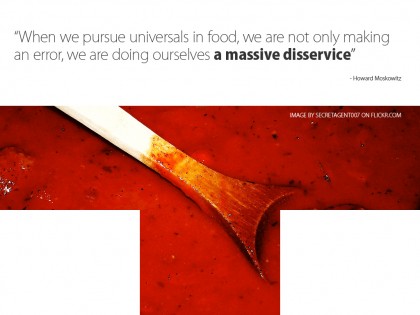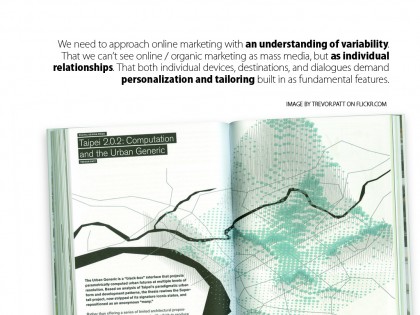In an online world full of nuances and variables, is the universal mindset of mass media affecting our ability to make people deliriously happy?
Mass media forces brands to find one consistent voice, communicating one story or one set of values to a large part of a population. This mindset is valuable for the mass media industry, which is fine. But online/organic/cloud based services’ and applications are not mass marketing, not media, and by that needs, or demands, a different mindset.
Where as display advertising survives on a marketing relationship approach (generic and universal) services and applications for organic platforms need a more individual and personal product relationship approach. This means that any destination – from your online web site to your smart phone application or a participation / dialogue initiative has to be built for the niches, not the idea of universals.
Malcolm Gladwell, at TED in 2004, talks about Howard Moskowitz, a psychophysicist that reinvented spaghetti sauce with the result of making the American people happier. Moskowitz can be attributed with discovering that there are no universals in the food industry
. That reality is too diverse and can’t be identified by one or some universal principles.

At the end of the presentation Gladwell references one example with coffee, where he says that if he was to design one brand of coffee to fit everybody, it would rank at a bout a 60 on a taste satisfaction ranking from zero to a hundred. But he was to divide us into coffee clusters of three or more, he could tailor coffee to each cluster, which would heighten the rank to about a 75 to 78. The difference is “coffee that makes you wince, and coffee that makes you deliriously happy”.
“When we pursue universals in food, we are not only making an error, we are doing ourselves a massive disservice” – Howard Moskowitz
As Gladwell also notes: Moskowitz introduced to the food industry what people in science had been working with for a long time; the move from the search for universals to the understanding of variability.

In our eagerness to understand online marketing we have borrowed a range of shortcuts from the different industries. Many of them have been interesting and valuable choices, especially in the parts of online that resembled traditional media, but a lot of them have been failures.
My point is that we need to approach online marketing with an understanding of variability. That we can’t see online / organic marketing as mass media, but as individual relationships
possibility of adverse drug reactions or drug generic viagra online options with patient.
. That both individual devices, destinations and dialogues demand personalization and tailoring built in as fundamental features.


I would completely agree that mass marketing is dead, but targeted marketing is actually doing quite nicely as you point out–specifically through our phones–those always with us, always on devices are perfect for it. The rise of mobile ads means that users will expect ads to not only be geo targeted, but also content relevant, and therefore useful, possibly even a welcome addition to the experience. As a person who has never, and I mean never, clicked on a banner ad, I can say that I not only clicked on a mobile ad recently, I actually made it through the last click and bought the item being advertised, it was that relevant. We are all opportunists, and if the ads being served offer us value, we will interact with them and it would seem this may be a win/ win for marketers and their audiences.
Hi Heather, thank you for contributing to this post.
First I’d just like to state that I don’t believe stuff dies, I think old stuff gets better at doing what its good at while new stuff emerges and takes over the tasks that the old stuff was bad at.
I regards to banners, I think they as a marketing tool works on some initiatives, but banners are just one tool. And my hope is that more of us start spending our time finding different ways to do marketing, building and understanding relationships, not improving the infrastructure of the old stuff (more ideas on that here: http://is.gd/b6mhI)
Thank you again for contributing :)
Best
Helge
Hi Helge,
Great blog BTW. Been a follower for a while when I get the chance to view.
I think the idea of variability is much the same of identifying niches. One can carpet bomb or one can lazer guide stuff, but that depends on the message too, but in each each case it assumes a static target.
The mechanics of variability are extremely complex when one considers moving or transient targets. ie. As modern consumers our attention is directed at constantly evolving and moving channels. So we have channel variables on top of the variability of the individual….The challenge is cubed!
Mass marketing static target / path of least resistance but will always be needed for the stuff which needs to be said fast and loud. It’s the intricate relationship stuff, which given the connectivity we now have, is akin to a metabolic pathway, …..There are patterns in there, but they’re going to take time to understand.
Cheers
Sam
Hi Sam
Thanks for adding your thoughts. :)
I have to ad that the inspiration for the post came after working with some projects this last year that were hard pressed to ad some tailoring to the web initiative in order to make their offer more relevant.
But in regards to the broader perspective of marketing as a whole, I agree with you.. there is a time for the masses and a time for the niches.
Best
Helge